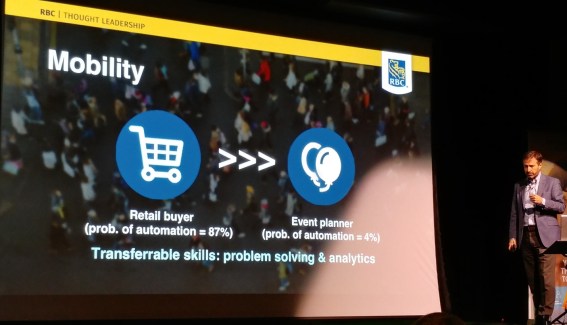It is a very familiar sentiment to those of us working in rural economic development. There are too many unfilled positions crippling growth in many sectors of the rural economy. We need more people.
Workforce development can take many approaches but the one most discussed at the 2018 Rural Talks to Rural conference held this October 2018 in Blyth, Ontario was preparing youth to survive and thrive in an age of disruption.
Royal Bank of Canada (RBC) released a report on the Canadian workforce in 2018 called Humans Wanted – How Canadian Youth Can Thrive in the Age of Disruption. John Stackhouse, VP of RBC, shared some of the findings of that report with conference delegates. The report has some sobering messages.
“Canada is facing a quiet crisis.
In the coming decade, half of all jobs will be disrupted by technology and automation. Some will change dramatically. Others will disappear completely, replaced by jobs that are yet to be invented.”
Using agriculture as an example the report showed some of the outcomes of technological disruption.

“We discovered that the four million Canadian youth entering the workforce over the next decade are going to need a foundation of skills that sets them up for many different jobs and roles rather than a single career path. They will need a portfolio of human skills such as critical thinking, social perceptiveness, and complex problem solving to remain competitive and resilient in the labour market.”
“We found that Canada is shifting from a jobs economy to a skills economy, and yet employers, educators and policy makers are not prepared.
Here are four things you need to know about the coming skills revolution and the future of work.
- Disruption is accelerating.
- Flexibility is the future
- Digital literacy is essential
- We need to prepare for the future of work.”
The report suggests one way to prepare is too look at skill clusters and group occupations within those clusters. It suggests that movement within a cluster makes mobility easier as clusters share common skills. So occupations within clusters only require the addition of a few new skills.
RBC suggests 6 clusters which include;
Doers, Crafters, Technicians, Facilitators, Providers and Solvers. When disruption hits within a cluster mobility is relatively easy. The photo below demonstrates mobility in the Providers Cluster.

These sentiments were echoed by Hans Vander Loo, in his statement, “We (must) educate our young for Jobs that do not yet exist to deal with problems we are not yet aware of.” Van der Loo, the EU Ambassador of the EU STEM Coalition and Chairman Advisory Board Institute for Integrated Economic Research (IIER) drove home the point that a 21st Century education must include;
- Knowledge – What you know
- Traditional subjects, modern subjects, robotics, entrepreneurship etc
- Skills – How you use what you know
- Creativity, critical thinking, communication and collaboration
- Character – How you engage with the world
- Curiosity, courage, resilience, ethics and leadership
- Metacognition – How you reflect and learn

Without these elements our youth will not be prepared to be part of the 21st Century workforce. Van der Loo also emphasized the importance of STEM education and starting that education young.
Van der Loo suggested that we have to look at our world with a certain urgency, he expressed a need to look at our world differently. He focused on sustainability, resilience and also humanity and kindness. These qualities together help build welcoming and resilient, rural communities which need youth to continue. Moving forward Van der Loo said the path is like a three wheeler and he provided links for more information for each “wheel”:
One wheel is sySTEMic thinking – critical, logical and holistic – STEMcoalition.eu;
2nd wheel is the quality of information & decision making – verimedia.org; and
3rd wheel is being less short-sited about reality –energyand stuff.org. Working from this threefold approach we can move forward and reach the other end of this century in a civilized and peaceful way. And that demonstrates true resilience.
Both Speakers came back repeatedly to the conference theme of resilience, by suggesting a resilient way forward is to start with our youth. How we educate them; build skills; encourage creative problem solving and keep reminding our youth that there is a place for them in rural Ontario where they can thrive. This will help us adapt and stay resilient in rural Ontario during the age of disruption as well as helping the entire country to thrive.

Van der Loo said “the number 1 responsibility of the of the collective leadership in society is to ensure that its most precious resource, TALENT, is adequately prepared towards successfully addressing its most pressing challenge – to reach the other end of this century in a civilized and peaceful way.”
To see the full presentations by John Stackhouse and Hans Van der Loo as well as other conference presentations go the R2R’s facebook page Talk Rural.


Leave a Reply